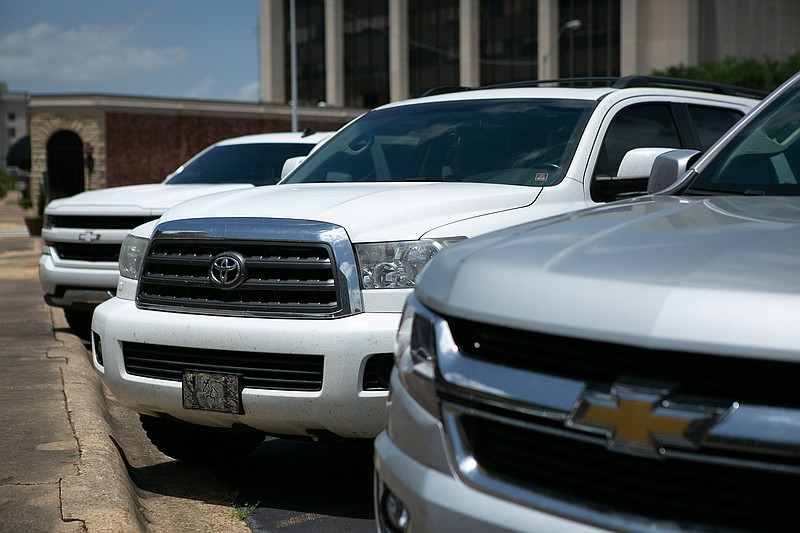A 1-year-old boy who died June 22 in Galveston, Texas, spent five hours inside a parked vehicle before he was discovered.
Just two days before, a 4-year-old boy was found unresponsive inside an SUV parked outside his home north of Dallas. He died two days later.
And a third child-a missing 2-year-old boy near Denton-was found dead Wednesday inside his neighbor's SUV.
Texas leads the nation in deaths of children left in hot vehicles, followed by Florida and California.
Five children have died in Texas this year from either being left in hot vehicles or from getting inside a vehicle and then being unable to get out. Temperatures inside a vehicle can reach triple digits within minutes during the summer months.
"It happens, and it happens relatively close to here," said Shawn Vaughn, spokesman for Texarkana, Texas, Police Department.
There have been 17 hot car deaths this year so far, according to the National Highway Transportation Department, including the five in Texas. Children dying from heatstroke in cars, either because they were left or became trapped, have reached a record number. In 2018, 52 children lost their lives-the most in over 20 years, according to the NHTD.
Anyone who sees a child or a pet inside a parked car in the heat should call 911, and an officer will immediately be sent to the scene, Vaughn said.
Breaking glass in the vehicle to free the child yourself should be a last resort unless the child or pet is in obvious distress.
"If you are afraid that they might not make it until the officers can get there, then you should do what you think is necessary," Vaughn said. "But the important thing is to get help on the way by calling 911."
Police response time in this situation would be very quick, Vaughn said.
"In a case like this, time would be of the essence and it would not be something that could wait. An officer would be taken off another call if they had to," he said.
Texarkana, Ark., police also recommend that a concerned citizen call 911 first.
"Depending upon the circumstances, breaking a window to save a life could be a defense however, this is not a guarantee. Each individual event would have to be weighed on its particular set of circumstances. Unless it is apparent the person/animal is in immediate distress, a person should contact 911 to report it to police," said TAPD Lt. Zachary White.
Texas is one of 19 states with a law applying to leaving children in vehicles. In Texas, it is a class C misdemeanor to knowingly leave a child age 7 or younger in a vehicle longer than five minutes.
The remaining states-including Arkansas-do not have laws specifically against leaving a child unattended in a vehicle, but injuries and deaths can be prosecuted under child endangerment, manslaughter and homicide statutes.
Texas has a Good Samaritan law in place to protect people who help children 7 and under or anyone who is considered vulnerable and unable to protect themselves, according to Kidsandcars.org. Arkansas does not.
The worst mistake any parent or caregiver can make is to think tragedies like the ones in Texas recently could never happen to them, according to information from the nonprofit KidsandCars.org.
More than half of vehicular heatstroke cases from 1998 to 2018 were because an adult forgot about a child, according to NoHeatstroke.org. Among the trends the group discovered in these incidents:
- About 44 percent of the time, the caregiver meant to drop the child off at daycare or preschool.
- The end of the workweek-Thursdays and Fridays-saw the highest number of deaths.
KidsAndCars has advocated for the auto industry to routinely install a "driver reminder system" when children are placed in back seats, as small children should be, with their car seats facing backwards-a system that, while safest in case of accidents, also lends itself to overlooking a child who quietly falls asleep. There are also after-market alarms that parents already can buy to help remind them.
The group also recommends:
- Make it routine to open your vehicle's rear door and check the back seat every time you leave your car, even if you think you know your child isn't there. Putting something that you need-your cellphone, a briefcase, a purse-in the back seat can reinforce the habit.
- Keep a stuffed animal in your child's car seat. Then when you put your baby in, move the animal to the front seat as a reminder.
- Ask your child-care provider to call you immediately if your child does not show up as planned.
- Be extra cautious when there has been a change in routine.
- Don't take the chance. Always look in the front and back of the vehicle before locking the door and walking away.
However, vehicular heatstroke deaths don't just happen when a child is forgotten. The second leading cause of such deaths, about 26 percent, are children getting into unattended vehicles. Parents and caregivers should be in the habit of always locking car doors and trunks year-round. The temperature inside a car can reach 110 degrees, even when the temperature outside is as low as 57 degrees.
To prevent a child from getting into your vehicle unsupervised, always keep keys out of reach of children and keep your vehicle locked. If your child goes missing, immediately check the inside and trunks of all vehicles in the area.


